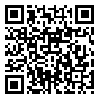Tue, Feb 3, 2026
[Archive]
Volume 14, Issue 41 (2021)
J Med Edu Dev 2021, 14(41): 42-51 |
Back to browse issues page
Download citation:
BibTeX | RIS | EndNote | Medlars | ProCite | Reference Manager | RefWorks
Send citation to:



BibTeX | RIS | EndNote | Medlars | ProCite | Reference Manager | RefWorks
Send citation to:
Badiyepeymaiejahromi Z, Shadfard Z, Motaseri M, Maarefi F, Pournoroz N, Taghizadeganzadeh M. Study on the Relationship of Happiness, Ethical Climate, and Perceived Stress with Self-esteem of Nursing and Paramedical Students of Jahrom University of Medical Sciences in 2018. J Med Edu Dev 2021; 14 (41) :42-51
URL: http://edujournal.zums.ac.ir/article-1-1304-en.html
URL: http://edujournal.zums.ac.ir/article-1-1304-en.html
Zohreh Badiyepeymaiejahromi1  , Zahra Shadfard2
, Zahra Shadfard2  , MohammadAli Motaseri3
, MohammadAli Motaseri3  , Faride Maarefi4
, Faride Maarefi4  , Neda Pournoroz5
, Neda Pournoroz5  , Mahboobeh Taghizadeganzadeh *6
, Mahboobeh Taghizadeganzadeh *6 
 , Zahra Shadfard2
, Zahra Shadfard2  , MohammadAli Motaseri3
, MohammadAli Motaseri3  , Faride Maarefi4
, Faride Maarefi4  , Neda Pournoroz5
, Neda Pournoroz5  , Mahboobeh Taghizadeganzadeh *6
, Mahboobeh Taghizadeganzadeh *6 
1- Faculty of Nursing, Jahrom University of Medical Sciences Jahrom, Iran
2- Faculty of Operating Room Department, School of Nursing and Paramedical Sciences, Jahrom University of Medical Sciences, Jahrom, Iran
3- Faculty of Nursing Department, School of Nursing and Paramedical Sciences, Jahrom University of Medical Sciences, Jahrom, Iran.
4- Faculty of Nursing Department, Jahrom Islamic Azad University, Jahrom, Iran
5- Instructor of Nursing Department, School of Nursing and Paramedical Sciences Jahrom University of Medical Sciences, Jahrom, Iran
6- Faculty of Operating Room Department, School of Nursing and Paramedical Sciences, Jahrom University of Medical Sciences, Jahrom, Iran ,mahboob.6691@yahoo.com
2- Faculty of Operating Room Department, School of Nursing and Paramedical Sciences, Jahrom University of Medical Sciences, Jahrom, Iran
3- Faculty of Nursing Department, School of Nursing and Paramedical Sciences, Jahrom University of Medical Sciences, Jahrom, Iran.
4- Faculty of Nursing Department, Jahrom Islamic Azad University, Jahrom, Iran
5- Instructor of Nursing Department, School of Nursing and Paramedical Sciences Jahrom University of Medical Sciences, Jahrom, Iran
6- Faculty of Operating Room Department, School of Nursing and Paramedical Sciences, Jahrom University of Medical Sciences, Jahrom, Iran ,
Abstract: (6067 Views)
Background & Objective: Medical students should have adequate self-esteem to deal with stressful situations and have proper compatibility. Since self-esteem is affected by internal and external factors, the present study aimed to investigate the relationship between students’ self-esteem with variables of happiness, ethical climate, and perceived stress at Jahrom University of Medical Sciences.
Materials & Methods: This correlational study was performed in the second semester of 2018-2019 and 316 students were selected by consensus sampling method. Data were collected using the Rosenberg Self-Esteem Scale, Oxford Happiness Questionnaire, Olson's Hospital Ethical Climate Survey, and Cohen’s Perceived Stress Scale. Data analysis was performed in SPSS version 16 using descriptive and analytical statistics. Results: : In this study, the mean and standard deviation of self-esteem, happiness, ethical climate, and perceived stress were calculated at 4.06±4.45, 41.87±12.39, 91.28±13.81, and 26.39±6.33, respectively. We found a significant correlation between happiness (r=0.431, P<0.001) and perceived stress (r=-0.427, P<0.001) with the self-esteem of students. On the other hand, there was no significant relationship between ethical climates with the self-esteem of students. According to the multiple linear regression analysis results, happiness and perceived stress of students predicted 26% of the self-esteem variance.
Conclusion: Due to the relationship between students’ self-esteem and the variables of happiness and perceived stress, it is recommended that programs be developed to increase happiness and decrease stress in students so that their self-esteem could be improved.
Materials & Methods: This correlational study was performed in the second semester of 2018-2019 and 316 students were selected by consensus sampling method. Data were collected using the Rosenberg Self-Esteem Scale, Oxford Happiness Questionnaire, Olson's Hospital Ethical Climate Survey, and Cohen’s Perceived Stress Scale. Data analysis was performed in SPSS version 16 using descriptive and analytical statistics. Results: : In this study, the mean and standard deviation of self-esteem, happiness, ethical climate, and perceived stress were calculated at 4.06±4.45, 41.87±12.39, 91.28±13.81, and 26.39±6.33, respectively. We found a significant correlation between happiness (r=0.431, P<0.001) and perceived stress (r=-0.427, P<0.001) with the self-esteem of students. On the other hand, there was no significant relationship between ethical climates with the self-esteem of students. According to the multiple linear regression analysis results, happiness and perceived stress of students predicted 26% of the self-esteem variance.
Conclusion: Due to the relationship between students’ self-esteem and the variables of happiness and perceived stress, it is recommended that programs be developed to increase happiness and decrease stress in students so that their self-esteem could be improved.
Article Type : Orginal Research |
Received: 2020/06/11 | Accepted: 2021/04/24 | Published: 2021/06/14
Received: 2020/06/11 | Accepted: 2021/04/24 | Published: 2021/06/14
Send email to the article author
| Rights and permissions | |
 |
This work is licensed under a Creative Commons Attribution-NonCommercial 4.0 International License. |




